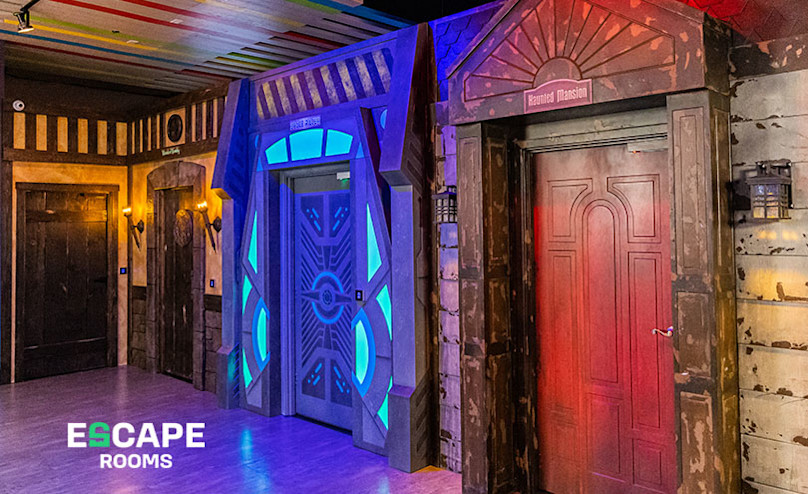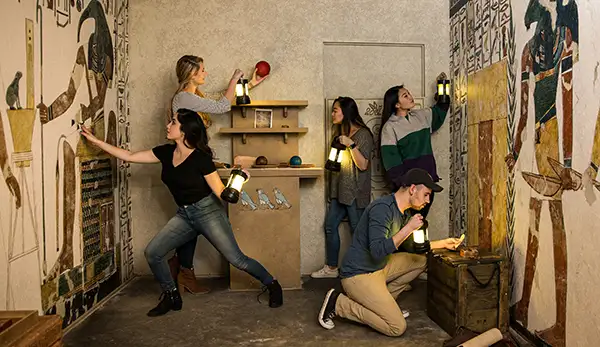Escape Room in Minneapolis-- A Perfect Activity for Any Kind Of Event
Escape Room in Minneapolis-- A Perfect Activity for Any Kind Of Event
Blog Article
Group Methods: Just How to Team up Efficiently in an Escape Room
Browsing the complexities of a retreat area necessitates more than mere interest; it needs a well-coordinated method grounded in clear communication, strategic duty tasks, and skilled time administration. Groups have to actively listen to each member's understandings, appoint functions that line up with individual toughness, and maintain routine check-ins to ensure emphasis and stop redundancy. By promoting an environment that values communication and versatility, teams can considerably heighten their performance and success rates. The subtleties of these methods can transform the experience, yet exactly how exactly can they be applied to take full advantage of the potential for success?
Establish Clear Interaction

To assist in clear interaction, it is crucial to designate a main factor of contact for info circulation. Quick, focused updates from each team participant can maintain the group notified without frustrating them with details.

Assign Roles Purposefully
While clear interaction sets the foundation for efficient synergy, designating functions strategically makes sure that each team participant's staminas are used effectively. In a retreat space situation, the time-sensitive and complex nature of obstacles requires an efficient strategy to job delegation. By recognizing and leveraging private proficiencies, teams can maximize their analytical capabilities and improve overall efficiency.
First, analyze the unique abilities and features of each participant. As an example, someone with an eager eye for detail may master discovering surprise objects, while a rational thinker can be better fit to solving challenges - best escape room. It's similarly crucial to have a leader who can supervise development, take care of the timeline, and make crucial calls when needed. This duty frequently requires strong organizational and interpersonal abilities.
2nd, make certain that duties are versatile and adaptable. As new challenges emerge, the group must have the ability to pivot, reapportioning jobs as called for. This versatility assists preserve momentum and prevents bottlenecks that can take place as a result of stiff function projects.
Ultimately, a strategic approach to duty job not just makes the most of the strengths of each employee however also fosters a natural atmosphere, driving the team in the direction of an effective escape.
Utilize Diverse Abilities
Identifying and utilizing the varied skills within your team can dramatically raise your efficiency in a getaway area. Each staff member brings distinct strengths to the table, and properly leveraging these abilities can expedite analytical and enhance general efficiency. For instance, an employee with strong logical skills anchor may excel at understanding complex codes or patterns, while an additional with keen empirical capacities may promptly find surprise hints that might neglect.
Motivate team participants to voice their understandings and ideas promptly, ensuring that all possible solutions are considered. In addition, designating tasks that align with each participant's toughness can prevent traffic jams and guarantee that development is continuous.
Furthermore, diversity in abilities usually converts to variety in believing styles, which is indispensable in an escape room setup. While some difficulties may call for sensible reasoning and precision, others could benefit from imaginative and association of ideas. By recognizing and leveraging this variety, groups can deal with a more comprehensive series link of difficulties more properly, consequently enhancing their chances of an effective escape.
Manage Time Properly

Identify visible problems and split tasks based on team participants' toughness, making sure that nobody is idle. This technique can assist keep the group focused and prevent time from sliding away unnoticed.
Additionally, stay clear of one-track mind. If a puzzle is taking also long, turn team participants or go on to an additional obstacle, returning later with fresh perspectives. Interaction is critical-- maintain everybody updated on fixed problems and continuing to be tasks to stay clear of redundant initiatives.
Lastly, make use of any website here tips or clues moderately yet tactically - best escape room. Understanding when to ask for assistance can save useful time. By sticking to these time monitoring principles, groups can significantly improve their opportunities of a successful and satisfying getaway room experience
Debrief and Mirror
Representation is an important aspect of team growth and improvement in the context of escape rooms. Once the difficulty is completed, whether effectively or not, it is important for the group to take part in an organized debriefing session. This process permits team participants to evaluate their efficiency, recognize staminas, and determine areas for enhancement.
Start the debrief by reviewing what worked out. Highlight specific instances of effective communication, analytical, and cooperation. Identifying these favorable behaviors reinforces them and encourages their repeating in future difficulties.
Go over minutes of confusion, miscommunication, or inefficient techniques. Encourage an open and constructive discussion where group participants can share their point of views without worry of criticism.
Conclusion
In conclusion, successful cooperation in a getaway space is predicated upon clear interaction, critical function projects, the effective application of varied skills, and efficient time administration. Regular check-ins and organized debriefings are crucial for keeping focus and fostering continuous renovation. By producing a natural and adaptive team setting, the possibility of efficiently addressing challenges and achieving the purpose of getting away the room is dramatically improved. This approach not just guarantees success yet likewise advertises collective development and knowing.
Report this page